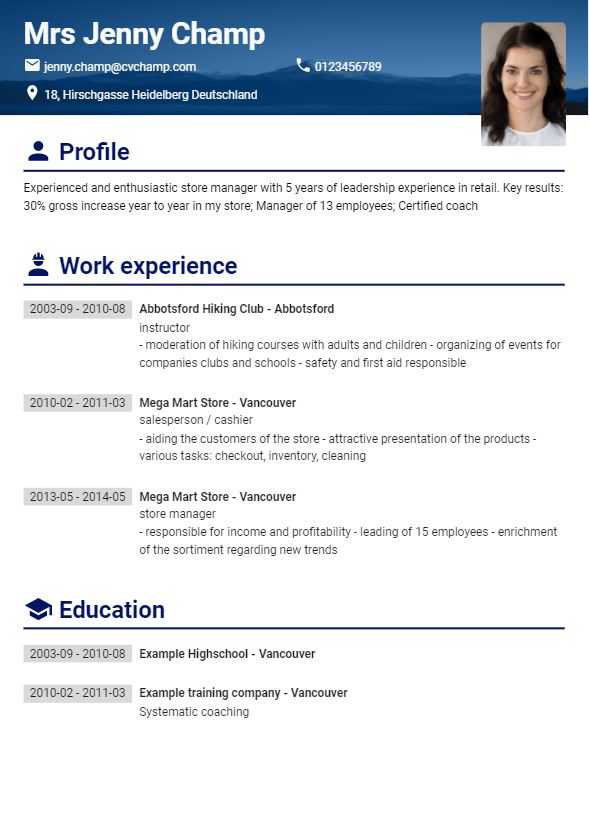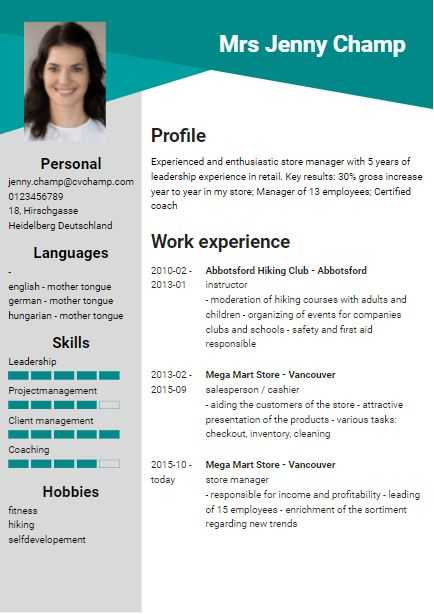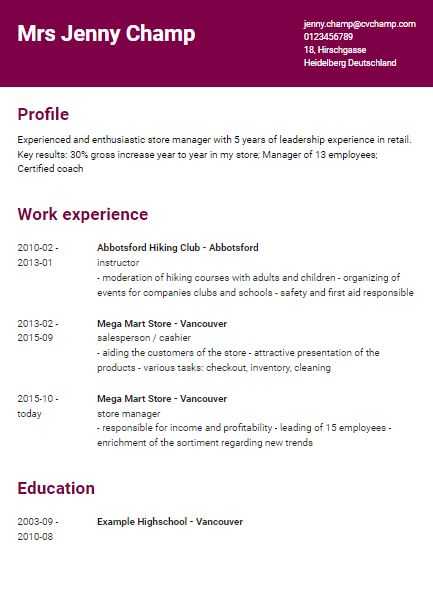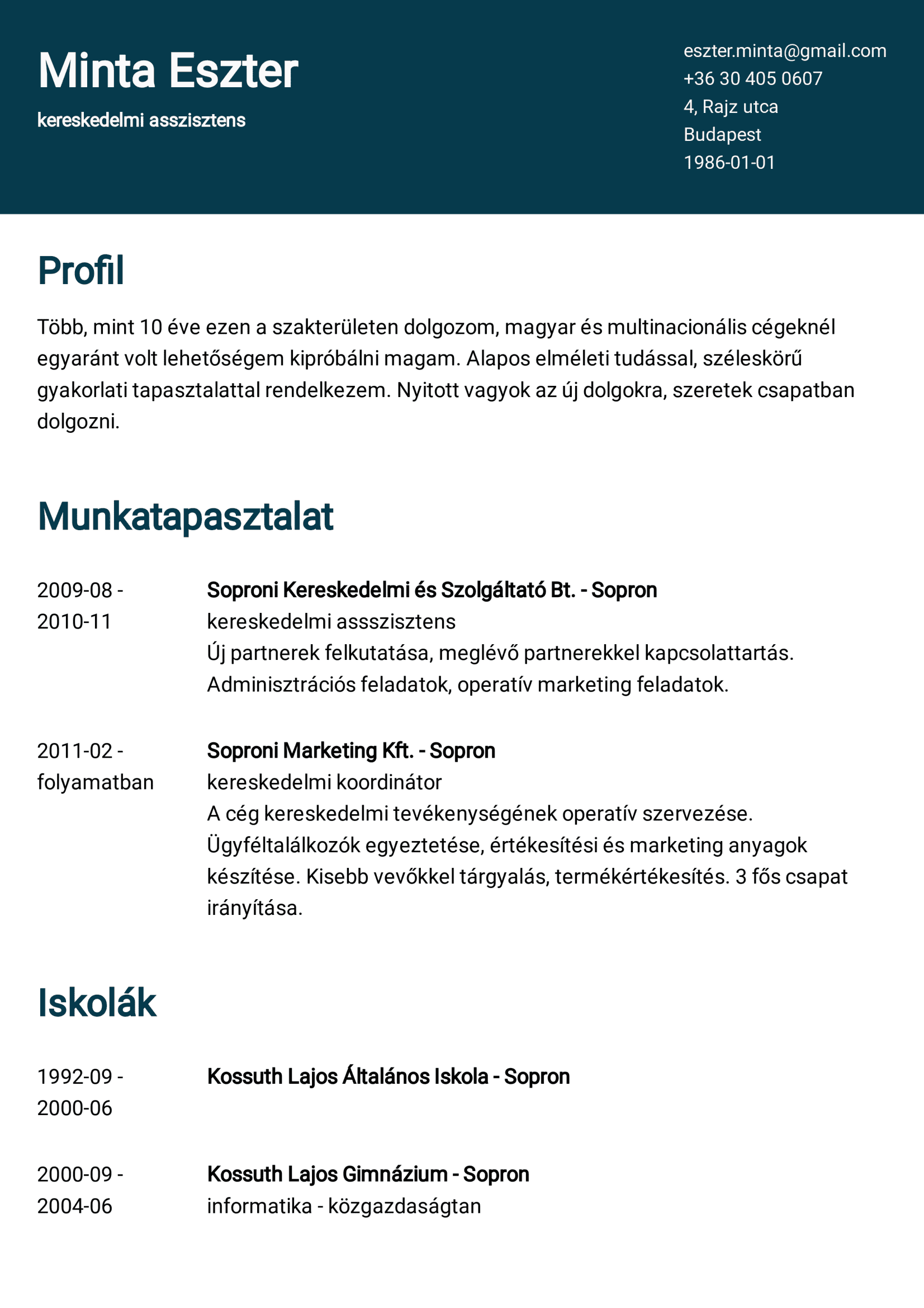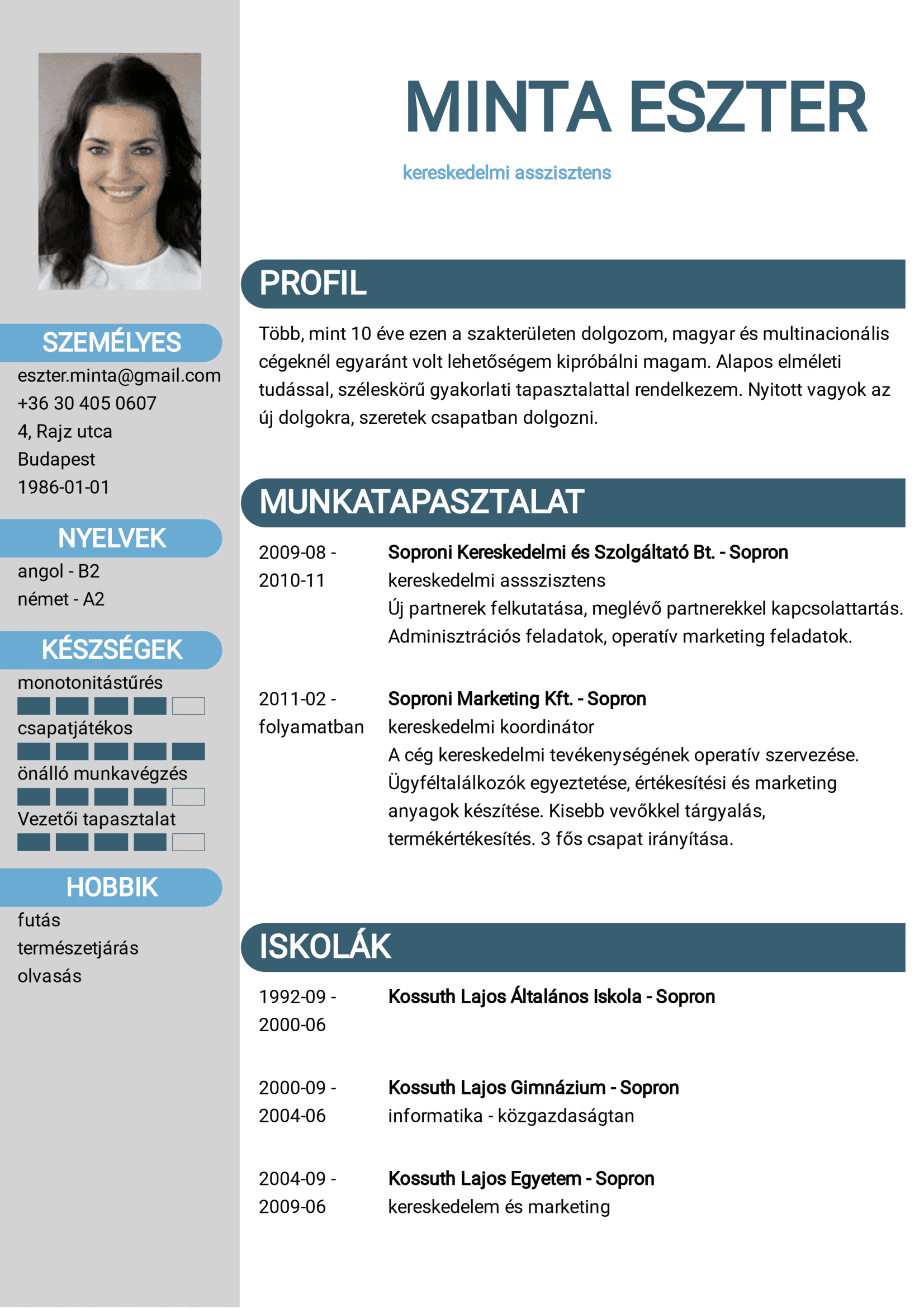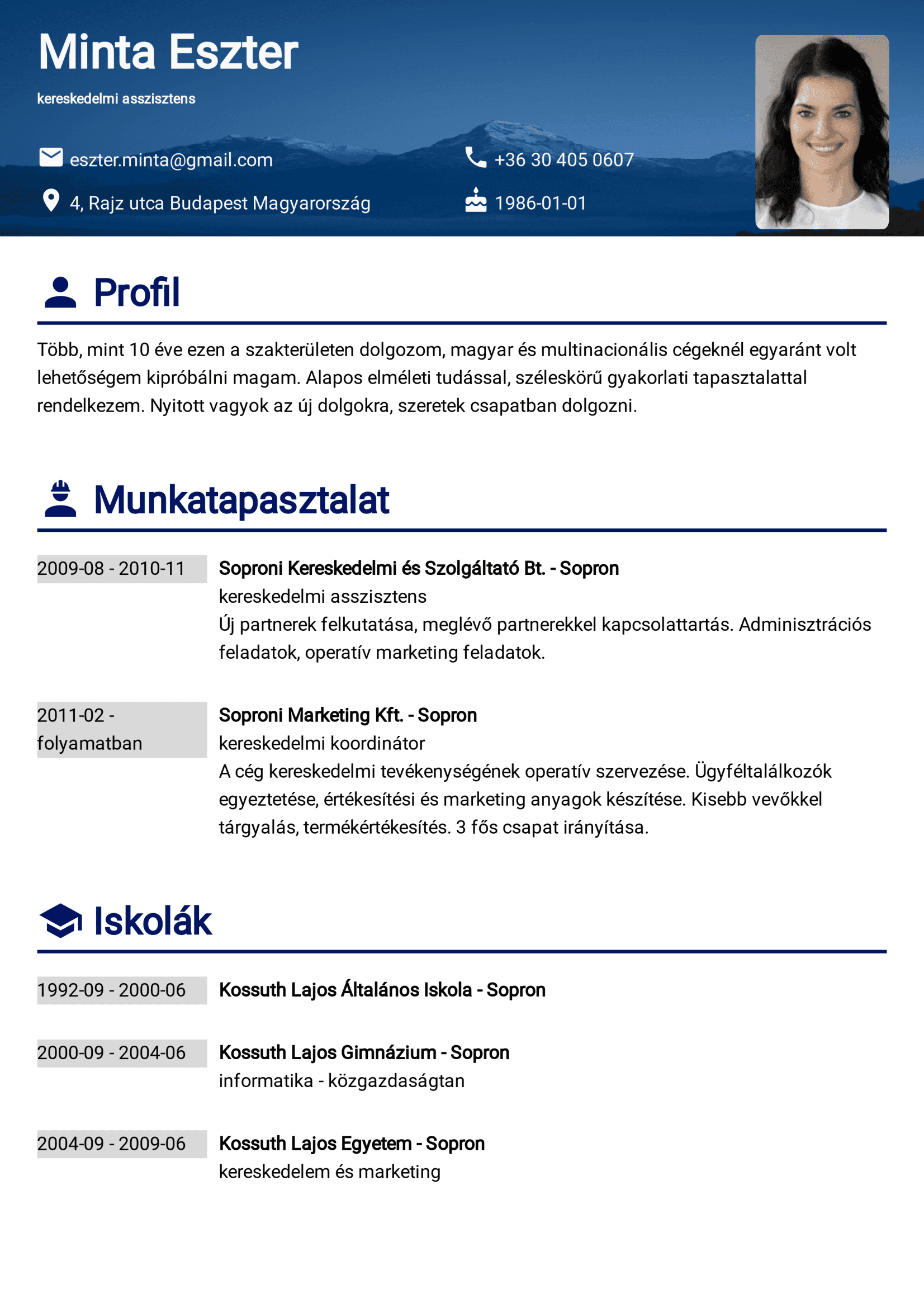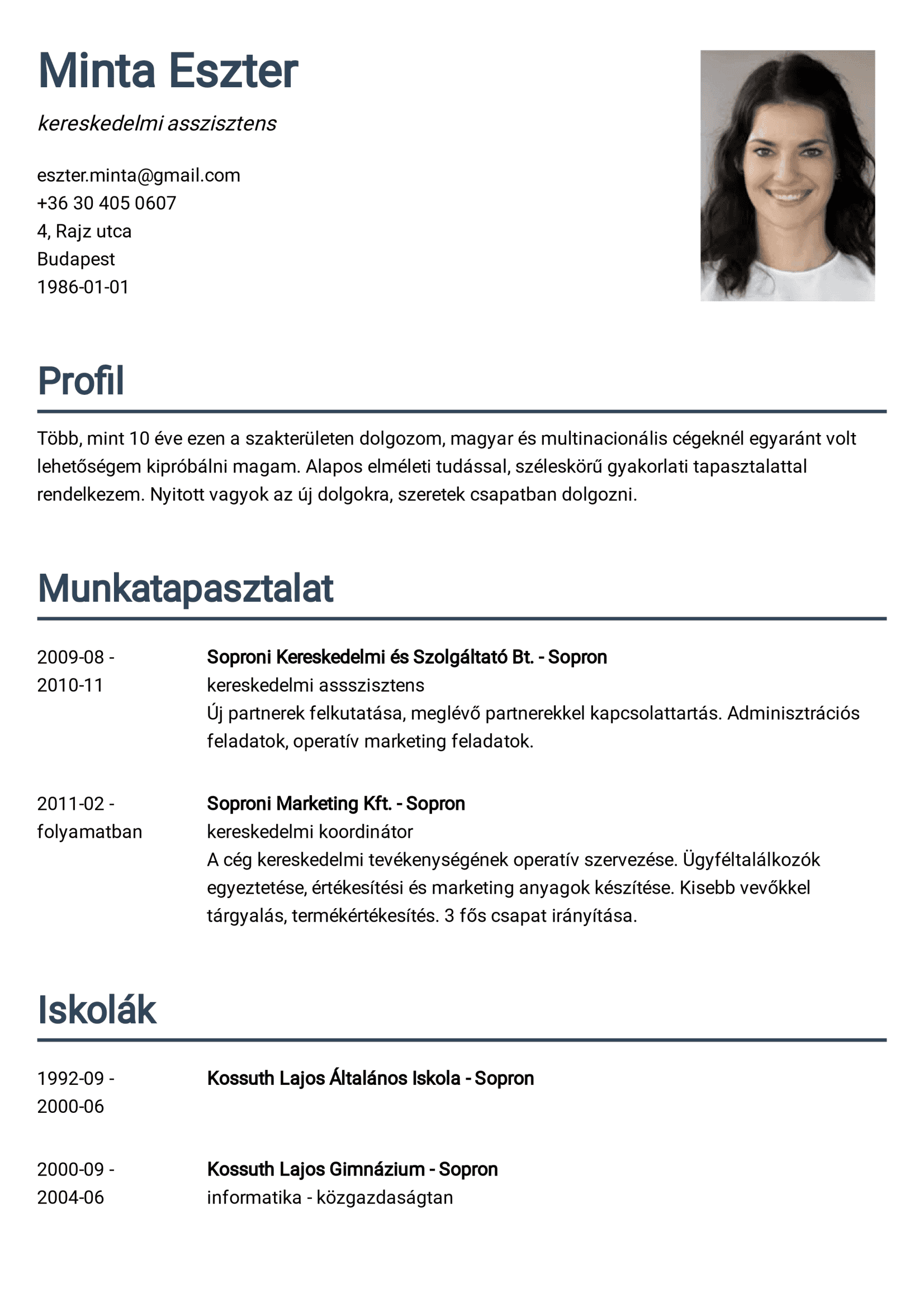

Tips and Sample for Writing a shop assistant CV
A shop assistant is a popular job these days: it's diverse, challenging and pays well. This popularity makes it very important to have a good CV to stand out from the crowd. In this article, we've put together some tips to help you perfect your CV!
Introduction, personal profile
The introduction at the beginning of your CV is a short, eye-catching summary of who you are, what your key strengths are and why you are applying for the job. It is very important to capture the reader's interest and highlight the most important information. Think of it as an advertisement, where we present ourselves. If the presentation is eye-catching, relevant, informative and unique, you are on the right track! If you'd like to read more about the introduction, read our article where we give you all the details.
Photo
Check the job advertisement first. In many cases, this will already tell you if the advertiser expects a photographic CV. Even if there is no reference to it, it may be worth sending a photo: a picture will immediately catch the reader's eye and a good photo will win their trust. As a shop assistant, your appearance can be an important factor, so an employer may prefer to select CVs with a photo. If you don't have a photo to include in your CV, read our useful tips in this article.
Training, Work Experience
Depending on whether you are a beginner or already have many years of experience, you will face different challenges in preparing your resume.
As a beginner, you still need to gain relevant work experience, making filling your resume with content harder. However, employers' expectations and evaluation criteria will also differ for these positions. Generally, you won't encounter unattainable expectations in job advertisements. Instead of previous work achievements, more emphasis is placed on education, extracurricular activities, soft skills, and motivation during the selection process. Therefore, in your resume, you can write more extensively about your education, the most important related subjects, and relevant achievements.
As an experienced employee, it's more common to need to select the most critical information. Remember that resumes might be received in the hundreds for a popular job, and employers won't spend time thoroughly reading a four-page document. It's best if everything fits into one, or at most, two pages. Focus on highlighting those experiences and results from previous jobs that may be important for the position you're applying for!
Skills
There are many types of retail stores, so the tasks of store clerks can vary significantly. Typical in every store is the need to help customers: provide guidance and advice, listen to their needs, and find the best solution. Good communication skills and empathy will always be necessary.
Product Knowledge
Depending on the store's sales, you may need experience or appropriate training regarding the products. Typically, knowledge of products and technologies is vital in stores selling electronics, computer technology, or other industrial goods.
Physical Endurance
In many places, clerks are responsible for receiving goods from suppliers and restocking shelves. This often involves moving pallets and packaging, so be prepared for this. If you have health issues that could hinder you, it's worth clarifying so that the employer doesn't place demands on you that you can't meet.
Mental Preparedness, Precision
If you have to work at the cash register, you can't afford to be imprecise, but the same goes for rotating stock, arranging shelves, or inventory. In many places, the basic expectation is to complete your work quickly and accurately.
Flexibility
Due to store opening hours, you'll need to be able to work early mornings, evenings, or weekends. Sometimes, you may need to fill in for others due to illness or vacations, so overtime is not out of the question. To handle these, you need to be flexible.
Language Skills
If you want to work in a store with many foreigners or tourists, you may need to speak a foreign language.
Team Player
If you're not the only clerk in the store, and you don't have to do every task yourself, you must work well with your colleagues. It's essential that you can communicate well, divide tasks, and help each other out.
What to Pay Attention to When Writing Your Resume?
We've collected some tips to help you create your perfect resume.
Don't Make It Too Long!
Remember, less is sometimes more! Ideally, your resume should be one page long, and don't write more than two pages, even if you have a lot of experience and qualifications related to the advertised job. The employer won't read it all or will skim through it, possibly overlooking the most important information. Your chances are better if you select carefully. List only the most important results related to the job! During interviews, you can talk more about where and what experience you gained; you don't need to cram everything into your resume.
Simple and Concise Language Use
Don't write complex, hard-to-understand sentences; no one will spend too much time untangling them. You don't have to write only simple sentences but don't make it difficult for those reading your resume. Avoid unnecessarily many foreign words and complicated expressions. It's important to show your professional expertise, but it will soon become apparent in interviews if you try to make yourself look much better. On the other hand, please don't go too far in the opposite direction either: slang, sloppy, and ambiguous phrasing will all create a negative impression; it's better to avoid these. Instead, be honest, clear, and understandable, and don't exaggerate. Avoid clichés and overly general expressions, take the time, and tailor your resume to the specific company.
Spelling and Grammar Accuracy
Pay special attention to ensuring that your resume is grammatically correct and free of spelling errors. Despite perfect content and stylish formatting, mistakes, nonsensical sentences, or other grammatical errors can spoil the overall impression. The reader will think you didn't spend enough time on your resume or are not careful enough with the work you produce. Fortunately, several valuable tools can help with spell-checking:
-
Use a word processor: Many word processors have a spell-check function. You shouldn't blindly trust it in every case, but it will help spot obvious errors you may have overlooked.
-
Ask for opinions from acquaintances: Have family members and friends read it. An untrained eye will always spot mistakes quicker than someone who has spent much time composing the sentences.
-
Use a resume generator: If the generator has this feature, use it to create a flawless introduction with minimal effort.
Make It Customized
First, read the job advertisement carefully! Your resume will be effective if you align it with the emphasized requirements in the ad – at least the most important ones. Highlight those experiences that will be indispensable in everyday work. Use the keywords mentioned in the ad and tailor your resume as much as possible to the specific job.
Uniform Formatting
A general consideration when preparing a resume is to create a uniformly formatted, tasteful document. Use consistent font types, sizes, and paragraphs in your resume. Arrange the introductory text so it doesn't take up too much space on the first page, yet use a font size large enough to be easily readable. If you want to create a professional resume, also make sure that the content and the resume's appearance match the job you're applying for. In areas where a more conservative approach is typical, a resume that emphasizes content and has a minimalist or clear, readable appearance will stand out. In contrast, for creative professions, it may be significant if you apply with a resume that has a unique format and textual style. In this case, you can be more imaginative, but it's still important that the final result is a uniform, tasteful document containing sufficient information. Using a resume template or a resume generator can be helpful, as they make it easier to focus on the content by taking the burden of appearance and formatting off you, resulting in a well-formatted resume.
Honesty
Letting your imagination run wild and spruce up your resume a bit seems tempting. You might think that adding a few extra skills or characteristics will significantly improve your chances. It's not worth it! It could have disastrous consequences if revealed during the recruitment process. And even if you somehow get through that, the threat of your deceptions being uncovered during everyday work will always hang over your head. During the probationary period, the company can dismiss you at any time if you don't fit in, so I think there's little point in painting a false picture of yourself in your resume. However, honesty can also be an advantage during an interview. It will undoubtedly contribute to your positive image during the interview if you're willing to talk about your shortcomings (and perhaps what you're doing to improve in those areas).



